Welcome to Poem of the Day – Vitae Summa Brevis by Ernest Dowson
Vitae Summa Brevis is a short yet powerful poem written by the English poet Ernest Dowson. Though only four lines long, the poem leaves a deep impact. It talks about time, love, and loss. Dowson belonged to the Decadent movement of the late 19th century. His work is known for its beauty, sadness, and emotional depth. This article explains the meaning and message behind Vitae Summa Brevis in a clear and simple way.
Vitae Summa Brevis Poem
They are not long, the weeping and the laughter,
Love and desire and hate:
I think they have no portion in us after
We pass the gate.
They are not long, the days of wine and roses:
Out of a misty dream
Our path emerges for a while, then closes
Within a dream.
Vitae Summa Brevis Explanation
Title Meaning
The title is Latin and comes from the Roman poet Horace. It means:
“The brief sum of life forbids us to hope for long-lasting things.”
This idea sets the mood for the poem. Life is short. We cannot expect lasting joy or stability. This message was important to Dowson, who faced many personal losses.
Line-by-Line Explanation
Line 1: “They are not long, the days of wine and roses:”
This line shows that happy times do not last.
The words “wine and roses” represent beauty, love, pleasure, and youth.
Dowson tells us that such moments are brief. Life moves quickly. Joy is fleeting.
Line 2: “Out of a misty dream”
Here, life is compared to a dream.
It is unclear, foggy, and hard to hold onto.
We are not fully awake to it—it passes before we understand it.
Line 3: “Our path emerges for a while, then closes”
This line talks about life itself.
We are born, we live for a short time, and then we die.
Our journey appears briefly and ends quietly.
There is no lasting mark. The path is temporary.
Line 4: “Within a dream.”
This final line circles back to the dream image.
It tells us that life begins and ends in mystery.
Even while we are alive, we are still within a dream—something not fully real or permanent.
Themes of the Poem
1. The Shortness of Life
The main idea of the poem is that life is very short.
Dowson reminds us that we should not expect things to last.
He shows that beauty and joy fade quickly.
2. The Illusion of Reality
By using dream imagery, Dowson suggests that life is not fully real.
What we experience feels like a dream—uncertain and passing.
We cannot control time, and we often do not understand it.
3. Melancholy and Loss
There is sadness in this poem.
Even the most beautiful things disappear.
Dowson often wrote about loss, and this poem reflects his own sorrow.
Background on Ernest Dowson
Ernest Dowson (1867–1900) was a British poet and writer.
He was part of the Decadent movement, which focused on beauty, sadness, and strong emotion.
Dowson’s life was full of hardship. He struggled with poor health, heartbreak, and financial trouble.
His poems reflect a deep sense of longing and sorrow.
Famous Influence: “Days of Wine and Roses”
This poem inspired many later works.
The phrase “days of wine and roses” became famous.
It was used as the title of a 1962 movie about love and loss.
It also appeared in songs, books, and other poems.
Dowson’s words have touched generations of readers.
Conclusion
Vitae Summa Brevis is a brief but powerful poem.
It reminds us that life is short and often feels like a dream.
Ernest Dowson uses simple language to share deep emotions.
His message is sad but beautiful: enjoy the moments of life, because they do not last.
Even in just four lines, Dowson captures the heart of human experience—joy, time, and the shadow of loss.

